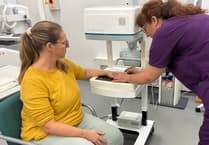The closest stretch of motorway to the South Hams won’t become a ‘smart’ anytime soon.
The M5 which starts at Exeter is currently ‘smart’ between Bromsgrove and Worcester meaning active traffic management is used including variable speed limits and motorists able to drive on the hard shoulder at times.
The rollout of new smart motorway schemes will be paused until a full five years’ worth of safety data is available, as the Department for Transport invests £900 million to improve safety on existing All Lane Running (ALR) motorways.
In line with the Transport Committee’s most recent recommendations, the rollout of new ALR smart motorways will be paused until a full five years’ worth of safety data becomes available for schemes introduced before 2020. After this point, the Government will assess the data and make an informed decision on next steps.
Although available data shows smart motorways are comparatively the safest roads in the country in terms of fatality rates, while their rollout is paused, the Government will go further by ensuring current smart motorways without a permanent hard shoulder are equipped with best-in-class technology and resources to make them as safe as possible.
This will include investing £390 million to install more than 150 additional Emergency Areas so drivers have more places to stop if they get into difficulty. This will represent around a 50% increase in places to stop by 2025, giving drivers added reassurance.
The Department for Transport has welcomed the Transport Committee’s report, which endorsed its focus on further upgrading the safety of existing ALR smart motorways rather than reinstating the hard shoulder. As concluded by the Committee, evidence suggests hard shoulders do not always provide a safe place to stop, and by reducing motorway capacity, they could put more drivers and passengers at risk of death or serious injury if they were to divert onto less safe local roads.
Transport Secretary Grant Shapps said:
“One of my first actions as Transport Secretary was to order a stocktake of smart motorways and since then, I have worked consistently to raise the bar on their safety. I am grateful to the Transport Committee and to all those who provided evidence for its work.
“While our initial data shows that smart motorways are among the safest roads in the UK, it’s crucial that we go further to ensure people feel safer using them.
“Pausing schemes yet to start construction and making multi-million-pound improvements to existing schemes will give drivers confidence and provide the data we need to inform our next steps. I want thank safety campaigners, including those who have lost loved ones, for rightly striving for higher standards on our roads. I share their concerns.”
National Highways CEO Nick Harris said:
“We have listened to public concerns about smart motorways and we are fully committed to taking forward the additional measures the Transport Committee has recommended.
“While we pause those all lane running schemes yet to start construction we will complete the schemes currently in construction, we will make existing sections as safe as they can possibly be and we will step up our advice to drivers so they have all the information they need.
“We are doing this because safety is our absolute priority and we want drivers to not just be safer, but also to feel safe on our busiest roads.”
Independent road safety campaigner, Meera Naran, whose 8-year-old son Dev, died in a motorway crash on the M6 in 2018, said:
“Conventional and smart motorways both have their risks and benefits. I welcome this pause in the rollout of smart motorways which will give us all a positive opportunity to assess the future of our motorway network.





Comments
This article has no comments yet. Be the first to leave a comment.